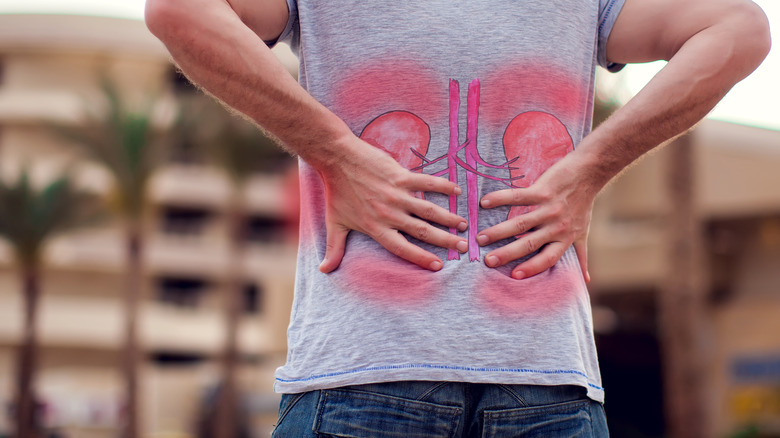This Is What You Can Do To Prevent Kidney Infections
The kidneys are incredibly important organs that are critical to the body's functioning. Without kidneys, our blood wouldn't get processed and detoxified, leading to potential nerve and muscle malfunction, according to the National Institute of Diabetes and Digestive and Kidney Diseases (NIDDK). Healthy kidneys are tiny powerhouses — every minute, they're filtering half a cup of blood, removing waste and excess fluid to create urine.
When a kidney gets infected, you shouldn't waste any time getting medical attention (via Mayo Clinic). A kidney infection, also known as pyelonephritis, is a type of urinary tract infection (UTI) that starts with bacteria in the urethra or bladder that spreads to the kidneys. Symptoms can include fever, chills, lower back and abdominal pain, a strong urge to urinate frequently, burning or pain when urinating, nausea, vomiting, and urine that has blood or is cloudy. You're more likely to get a kidney infection if you're female, as the urinary tract is shorter in the female body and situated close to the vagina and anus. You're also more at risk if you have a urinary tract blockage like a kidney stone, have a weakened immune system, use a urinary catheter, or have nerve damage near the kidneys. See a doctor if you develop symptoms or have a UTI that's not improving.
Simple ways to guard against infection
Luckily, kidney infections are treatable with antibiotics, if diagnosed in time (via Mayo Clinic). And there are things you can do to prevent them.
You can reduce your risk of getting a kidney infection by always making sure to drink plenty of water, according to the American Kidney Fund. Water helps to flush bacteria from the body through urination. You should also not wait to urinate, but rather go as soon as you feel the urge. It's particularly important for females to urinate soon after having intercourse, which helps to clear any bacteria from the urethra. Wiping from front to back after using the toilet will prevent any bacteria that comes from the anus or vagina from reaching the urethra. Finally, the use of feminine washes or sprays on the genital area should be avoided in order to prevent irritation.
If you think you may be developing a kidney infection, contact a healthcare professional as soon as possible. If left untreated, kidney infections may lead to permanent kidney damage or even travel to other parts of your body and cause more serious infections (via American Kidney Fund).


